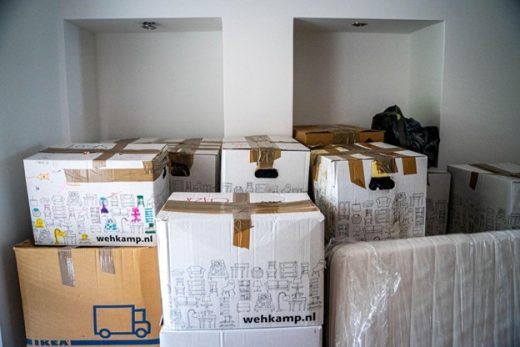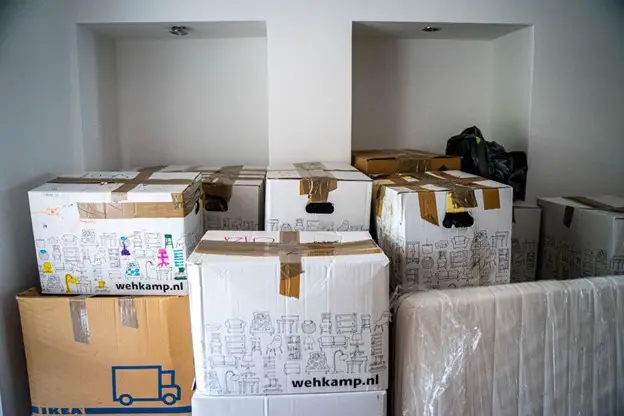How to stay sane while moving house, Home relocation expert tips, Building move and pack service guide
How to Stay Sane While Moving
27 Feb 2023

photo by Michal Balog on Unsplash
While moving is an exciting event, it can be overwhelming and stressful. Emotional elements associated with moving, including the stress around shifting with kids, financial preparedness, and the moving process, can drive you insane and even delay moving altogether. Coordinating moving dates, budgeting expenses, and packing on a timeline might make you anxious. Proper planning and preparation can help you manage the stress and anxiety relocating brings. This article gives you tips on how to stay sane while moving.
1. Hire a professional moving and packing service
Considering how daunting moving can be, collaborating with a full-service moving organization can be rewarding. Planning and implementing a move takes time, which can disrupt your daily routine. Doing everything in a hurry can also be stressful and may result in property damage and injuries. With the help of trusted relocation experts, your move will be planned and executed with utmost care. They have packing and shifting skills and experience, meaning they’ll get to your new location safely, preventing property damage and injuries.
Hiring a moving company can save you from moving risks and nightmares, especially long-distance moves. Moving has many unexpected problems, such as property damage from poor packing, handling, and truck movements. Poor weather or a truck developing mechanical issues can complicate your relocation journey. Luckily, a professional moving company will have a solution for every challenge, transporting everything safely regardless of the obstacles. This gives you peace of mind.
2. Create a moving checklist
A moving checklist helps ascertain that you have no issues organizing and packing your belongings. It’s an excellent way to ensure a smooth relocation. With a moving to-do list, you can organize your things better and sort everything fast, making it easier to unpack. It helps get things done more efficiently and smoothly, reducing moving stress.
It also ensures everything that should be done gets done while letting you know what to do and when. A moving checklist helps you keep track of essential documents and your belongings while reducing stress. Your checklist may include what you should do before the move, on the relocation date, and after moving to the new house.
3. Set a moving timeline
A moving timeline is a valuable tool for tracking constantly changing deadlines or events. When creating your timeline, consider when you should be out of the current home, when the new residence will be available, when to book a moving service, and when to report for work if you’re moving because of a new job. This information allows you to develop an effective timeline for a successful move. Start planning early so you have excellent date choices that suit your schedule.
Once you set the key dates, plan a personal timeline for what you should complete before the moving date, including cleaning, organizing yard sales or donations, packing, planning relocation day childcare, changing your address, transferring accounts and utilities, and more. You can book a local, long-distance, full-service, or DIY move based on where you’re relocating.
4. Consider decluttering
Decluttering before a move saves time and energy during and after relocating. You can donate some of your items or organize a garage sale when decluttering. The fewer things you have, the lower your moving expenses. Start the decluttering process early with the things and rooms you least use. Piling items into categories like keep, shred, trash, sell, donate, recycle, and store can help you declutter quicker and more efficiently. You can dedicate a few decluttering hours weekly, ideally on specific days, to build a routine.
If you’re downsizing, you can use a portable moving and storage container to store the things you’d like for future use and keep it at a storage facility or your new place. You can hire a junk removal service if you have many things to go through. These professionals can clean your attic, basement, or garage and remove heavy, unwanted items like old furniture.
5. Start packing early
Packing for a relocation is a significant task that can drain your energy and consume a lot of time. It can also be stressful, especially with time constraints. However, if you start packing early, you can ensure a problem-free and smooth process. It gives you more time to analyze situations and make the right choices. Beginning your packing on time allows you time to plan a successful moving sale while letting you safely pack your stuff. While you can hire a professional packing service, it can be costly, especially if you’re short on finances.
If you start packing in advance, you’ll finish on time, and you may not need to strain yourself financially to hire a professional packer. Before packing, gather all the essentials, including boxes, scissors or utility knives, tape, permanent marker, bubble wrap, plastic bags, and more. When packing, begin with the things you may need later and organize things from the same room together. Label every box by room and its contents and color code it by room. This will make it easier to unpack.
Endnote
Without proper planning, relocating can be stressful, affecting your emotional, physical, and mental health. Use these tips to stay sane while moving.
Comments on this How to Stay Sane While Moving article are welcome.
Moving Home Articles
House Moving Posts
Tips for a stress-free residential moving experience
Avoiding common moving mistakes
Ultimate moving checklist for stress-free move
7 challenges of moving to a new state
Building Articles
Comments / photos for the How to Stay Sane While Moving page welcome






